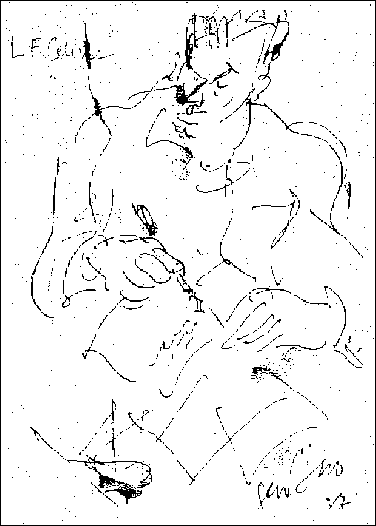Favorite
Poems
Louis Untermeyer, Editor
(MetroBooks)

Do not go gentle into that good night,
Rage rage against the dying of the light...
It was enough to make us give up our aspirations, to later wonder how we had ever thought for a moment that we could spend even a day in the parsing of such silly verse fabrications as those oozed out by Walter Savage Landor, George Meredith, Francis Thompson, Edwin Arlington Robinson.
Resurrecting this turkey may be a good retrospective on pain for those who would want to know how we suffered in such tedium some fifty years back. However, now, fifty years later, we can actually spy a few choice lines here and there: Millay burning both ends of the candle, Wilfred Owen dead a week before the end of hostilities ("What passing-bells for those who die as cattle..."), T. S. Eliot cultivating the faint stale smells of beer, sawdust trampled streets and
One thinks of all the hands
That are raising dingy shades
In a thousand furnished rooms...
These served, nicely, to feed our bleak view of humanity, mankind and the dying fall.
And, too, there were and are some new surprises as we wander through the five hundred or so pages (still set in the same occlusive type so favored in the books of that era): who would imagine that Tennyson could still speak to us with his eagle that
clasps the crag with crooked hands:
Close to the sun in lonely lands,
Ringed with the azure world, he stands
The wrinkled sea beneath him crawls;
He watches from his mountain walls,
And like a thunderbolt he falls.
And, too, like a thunderbolt --- John Donne, always a source of wonder, even back then. We recall a weekend in a motel with the our light of love, reading aloud to her as the day came to pass upon the shag-carpet beer-stained beaded-bedtable lamp room,
Busy old fool, unruly Sun,
Why dost thou thus,
Through windows and though curtains, call on us?
Must to thy motions lovers' seasons run?
Saucy pedantic wretch, go chide
Late school-boys and sour prentices...
Love, all alike, no season knows nor clime,
Nor hours, day, months, which are the rags of time...
Is it not still possible to be thrilled by a metaphysician who would arrogantly call the sun a "busy old fool" and a "Saucy pedantic wretch?"
Stephen Spender taught one class in poetry at UC 1958 - 1959. It was a sop in a department that showed scorn for anything in the verse world that had occurred after the Boer War. He was a good teacher, a gentle man (he had such tiny hands and an endearing kindness). He was able to convey his affection not only for words and sounds and the music of words --- but for the archness of the likes of Walter de La Mare,
Sweep thy faint strings, Musician,
With thy long lean hand;
Downward the starry tapers burn,
Sinks soft the waning sand;
The old hound whimpers couched in sleep,
The embers smoulder low;
Across the walls the shadows,
Come, and go.
Spender was the first to make us realize that D. H. Lawrence was more than a purveyor of questionable gambols of a lady and her country gardener,
Oh when man escaped from the barbed-wire entanglement
of his own ideas and his own mechanical devices
there is a marvellous rich world of contact and sheer fluid beauty
and fearless face-to-face awareness of now-naked life
and me, and you, and other men and women
and grapes, and ghouls, and ghosts and green moonlight
and ruddy-orange limbs stirring the limbo
of the unknown air, and eyes so soft
softer than the space between the stars.***
This volume is scarcely a "Treasure." Nor is it as it was called in the original, The Book of Living Verse. "Dead Poets Society" might be more like it. Still there are a few poets here who are not calcified, querelous and ready to be consigned to the grave. For those who care to parse through the bones and ashes, there are one or two that will bring back faint, faded wallpaper memories, suited to the times when you and I were sorting out our own loves and could almost without shame lie abed in that room smelling of Mr. Clean and ammonia, the two of us in the buff (my god how lovely we were) reflecting ourselves through the chipped and flaking round moderne mirror, reciting, between spasms the passions of the best of them all e.e. cummings
anyone lived in a pretty how town
(with up so floating many bells down)
spring summer autumn winter
he sang his didn't he danced his did.
Women and men (both little and small)
cared for anyone not at all
they sowed their isn't they reaped their same
sun moon stars rain
children guessed (but only a few
and down they forgot as up they grew
autumn winter spring summer)
that noone loved him more by more
when by now and tree by leaf
she laughed his joy she cried his grief
bird by snow and stir by still
anyone's any was all to her
someones married their everyones
laughed their cryings and did their dance
(sleep wake hope and then) they
said their nevers they slept their dream
stars rain sun moon
(and only the snow can begin to explain
how children are apt to forget to remember
with up so floating many bells down)
one day anyone died i guess
(and noone stooped to kiss his face)
busy folk buried them side by side
little by little and was by was
all by all and deep by deep
and more by more they dream their sleep
noone and anyone earth by april
wish by spirit and if by yes.
Women and men (both dong and ding)
summer autumn winter spring
reaped their sowing and went their came
sun moon stars rain***
***These, naturally, do not appear in Untermeyer's collection.